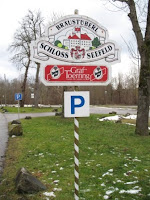Elias and I had a date in the Altstadt yesterday afternoon: we caught the new Pettersson und Findus movie at the Harmonie Kino and then had dinner at our favorite cheap restaurant, Euphrat.
On the way home, we stopped by the Thalia bookstore, where I coveted but did not buy the
Alemannisches Wörterbuch für Baden. I'm starting to think of suitcase space and schlepping things back to the U.S., and it's a big book. I suppose it would have to be, considering that there are fifty different ways just to say "potato." So instead, I went for a small pocket paperback entitled
Bairisch: das echte Hochdeutsch (
Bavarian: the real High-German), by Richard H. Kölbl.
The book offers a fine sample dialog on buying potatoes at the market, which I quote in its entirety (English translations added) because of what it tells us about both potatoes and market transactions in Germany:
Biddsche, wås deafsn sei?Bitteschön, was darfs denn sein?[Please, what would you like?]
I hädd gean ā Bfund Kadoffen.Ich hätte gerne ein Pfund Kartoffeln.[I'd like a pound of potatoes.]
Woiche woinSn då? De fesdn odā bißl woachāre?Welche wollen Sie da? Festkochende oder weichere?[Which kind would you like? Those that hold together when cooked or those that are soft (waxy or starchy)?]
De fesdn hädd i gean ghabd.Die festen, bitte.[I'd like the waxy ones.]
Deafs ā wengāl mearā sei?Darfs ein bisschen mehr sein?[Is it OK if there's a little more (than a pound)?]
āja freile.Natürlich.[Yes, sure.]
HåmS sunsd no ān Wunsch?Darf es noch etwas sein?[Do you desire anything else?]
Nā, dangsche, des wārs.Nein, danke, das wärs.[No, thanks, that's all.]
Dann machāds drei Eiro grådaus.Genau drei Euro, bitte.[That comes to three Euros even.]
(pp. 98-99)
What can we learn from this conversation?
First, observe the unit of measurement,
ā Bfund. In the U.S., we are taught that there are 2.2 pounds per kilogram.* In Germany, however,
ein Pfund is half a kilogram, an even 500 grams rather than 454 grams. To an American like me, that's kind of like saying
π is 3.2 (which, regrettably, is
an American sort of thing to say), but if you try to discuss this with, for example, your Bavarian husband, he gets all defensive. For marital harmony, we agree
ā Bfund is not a pound the world around.
It's a moot point, anyway, as demonstrated by the question,
Deafs ā wengāl mearā sei? It's not uncommon that when you ask for a certain amount of something, say 100 g of olives, the stall proprietor puts a 200 g scoop into a bag for you and then asks if the extra amount is OK. The good thing about this is that the proprietor has much more experience weighing olives than you do, so he knows that when you said 100 g, you really meant 200 g.
Next, observe that the exchange includes a pivotal question:
De fesdn odā bißl woachāre? In Germany, every potato has a role to play, a function to fulfill. It is vitally important to know what kind of potato to use for what situation. Perish the thought that you would use woachāre Kadoffen for a casserole, or fesdn for mashed potatoes. Be prepared for blank stares when you say you intend to
bake them. Germans probably bake potatoes as often as they bake pie, which is to say, close to never. The proprietor may have to consult with her colleague, but in the end you will get the best potato for the job.
Finally, notice the price:
drei Eiro grådaus. While the requested vs. proffered amount of olives might differ by a factor of two, it's easy to be more precise when weighing potatoes. At most you now have maybe a Pfund and a quarter. Dialect aside, you know you're in Bayern, and not in the bread-basket of Germany that is Baden-Württemberg, when a little more than a Pfund of potatoes costs a whopping three Euros. Note also that it costs
exactly three Euros, despite the bit of extra weight. Costs often get rounded down for ease of transaction--one of the pleasant bonuses of shopping at farmers' markets.
*On Earth, anyway, where, conveniently, both Germany and the U.S. are located. A pound is a unit of weight. A kilogram is a unit of mass--as is, apparently,
ā Bfund.












